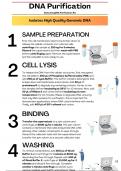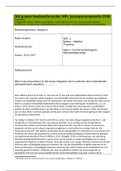Summary
Summary GeneJet gDNA Purification Guide
- Module
- Biology
- Institution
- University Of St Andrews
A detailed explanation of how to how to use the GeneJet purification kit and why each step is taken. Created by a graduate Biochemistry student who is now studying Biological Sciences at Cambridge University. This is designed to be used for all levels of learning, from GCSE to university. When lear...
[Show more]




